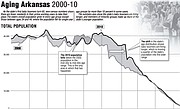UPDATE: Chattanooga payday lender lays off 400 after bank access shut down
Friday, August 16, 2013
READ MORE
Chattanooga payday lender forced to shut down websites
The online payday lending conglomerate controlled by Carey V. Brown has laid off most of its staff following a report in the Times Free Press today that New York regulators had removed its ability to make what the state called "illegal" loans.
"Due to the current regulatory environment and a contraction of the financial industry's support of [online] lending, we have determined that the ongoing viability of these companies is unsustainable," Brown's group said in a statement. "As a result, we regretfully had to eliminate 400 positions across all companies, of which approximately 300 are located in Chattanooga. We appreciate the commitment and hard work of our colleagues, and we wish them well."
Employee layoffs began this morning at the headquarters of Area203 Digital, Cloudswell, SupportSeven, ACH Federal, Eclipse in Action, Credit Payment Services and Credit Protection Depot - all of which operated as a single entity to make online payday loans across the country.
Workers carried out boxes, fans, backpacks and duffel bags, and parking lots began to empty before lunch. Employees walked out in twos and threes, some helping others load their cars before exchanging hugs in the parking lot. Workers reached by the Times Free Press declined to comment on the record.
Brian Hinton, senior vice president of administration and human resources for Cloudswell, said in in a letter to state regulators that the company would "permanently reduce a number of employees at the facility due to catastrophic unforeseen business circumstances."
"Within the past week, we have experienced regulatory pressure that has rendered the payment services of the financial services industry unable to support the ongoing operation of our customers," Hinton wrote.
Before New York regulators cut the businesses off from the automated clearing house system in early August, the payday conglomerate made short-term loans over the Internet that typically became due - with interest - on the customer's next payday. Different U.S. states have widely divergent laws governing the interest rates that lenders are allowed to charge, and Brown often ran afoul of these regulations.
He has been sued in several states for making loans with interest rates well above the legal limit, was the subject of a class-action lawsuit for sending thousands of spam text messages and was investigated by federal authorities.
Brown was forced to stop making loans in Tennessee following a series of Times Free Press articles in 2011 and 2012 that showed he was making loans with an interest rate in excess of what the state allowed, and was doing so without a license.


